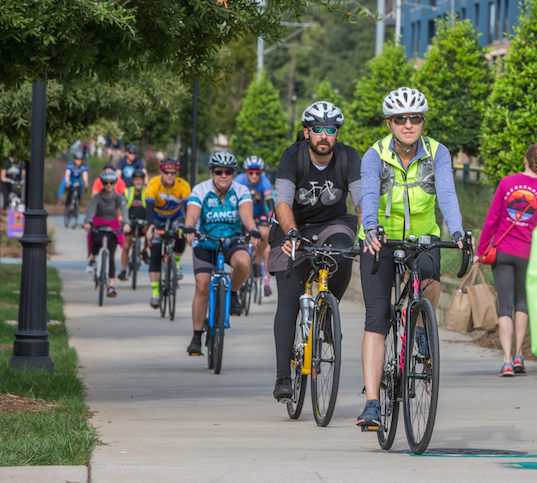Five steps you can take to slow climate change

Photographer: Grant Baldwin
With our state still reeling from the devastating impact of Florence, the world’s most esteemed climate scientists issued a dire warning: we have 12 years to act to avoid catastrophic climate change.
Here in North Carolina, we already know what catastrophe looks like. Florence gave us a taste of it, with unusually intense and destructive rainfall that scientists tell us was a result of climate change.
But if you’re like most Americans, you have moved beyond the tired debate about whether our climate is changing. You want to know how you can help prevent things from getting even worse.
This is a global problem that may cause you to feel helpless. You shouldn’t. You’ve heard the expression “think global, act local,” right? Here are five high-impact steps you can take to help:
1. Drive less, especially alone. Transportation is now the largest source of climate-changing greenhouse emissions in the US. Here in Charlotte, 40% of our emissions are due to transportation. If you haven’t tried riding the bus or light rail, give it a try. Riding public transportation can reduce a two-car household’s carbon footprint by up to 30%! Or try biking, walking, or grabbing a scooter for your shorter trips – you’ll have more fun while reducing your climate impact. If you must travel by car, consider carpooling with a co-worker or neighbor. You’ll not only cut your emissions, but you’ll also save money.
2. Support local investment in transit, bicycle, and pedestrian infrastructure. Driving less in Charlotte can be challenging because we haven’t invested enough in other ways of getting around. Charlotte and Mecklenburg County have robust plans to expand our transit, bicycle, pedestrian, and greenway networks – but these plans require funding to implement, and we need to tell our elected officials that this is what we want. It’s that simple: if you want more safe, convenient, and climate-friendly transportation choices, make it known. You can do this with a few clicks by signing Sustain Charlotte’s #GetThereCLT statement of support for these investments.
3. Support the construction of new apartments, condos, and townhomes – even if you don’t plan to live in them. Seventy percent of the land developed in Charlotte is for single-family homes – the most inefficient type of housing from both a land use and an energy perspective. On average, new townhomes and apartments built in Charlotte are housing 20 families on just one acre of land. In contrast, housing 20 families in single-family homes consumes five times as much land. With 400,000 more people moving to Charlotte in the next 20 years, think about how much more land and energy will be required if all of them move into single-family homes. This affects the climate because when homes sprawl across a larger land area, driving distances (and tailpipe emissions) increase, and the ability to conveniently walk, bike, and ride transit decreases. And of course, it takes significantly more energy to heat and cool a 4,000 square foot single-family home than a 1,500 square foot apartment.
4. Live closer to work. This is the hardest of the five to do, but if you have a long commute, and riding transit isn’t possible, this is one of the most impactful actions you can take to reduce your carbon footprint. It isn’t always possible to live closer to work, but the option is worth exploring. It may mean getting a smaller house than what you can buy for the same price farther from work and having a smaller yard. But you will spend less time (and money) commuting. And you’ll have more time for things that bring you joy in life, like spending time with family and friends.
5. Share this with others. We listen to the people we know best. Scroll down and click to share this essay with your network of friends, family, and co-workers via your preferred social media platform.
Charlotte – like the rest of America – stands at a critical crossroads. Assuring the long-term livability of our planet demands that we move quickly away from the car-centric system of sprawling development that has dominated our nation for most of the past century. This change begins with YOU.
Thanks for reading!
As a nonprofit, community support is essential for us to keep doing what we do — including providing free articles like this. If you found this article helpful, please consider supporting Sustain Charlotte.
Want to stay in the loop? Subscribe to our weekly newsletter and follow us on Instagram, Facebook, and Twitter.
